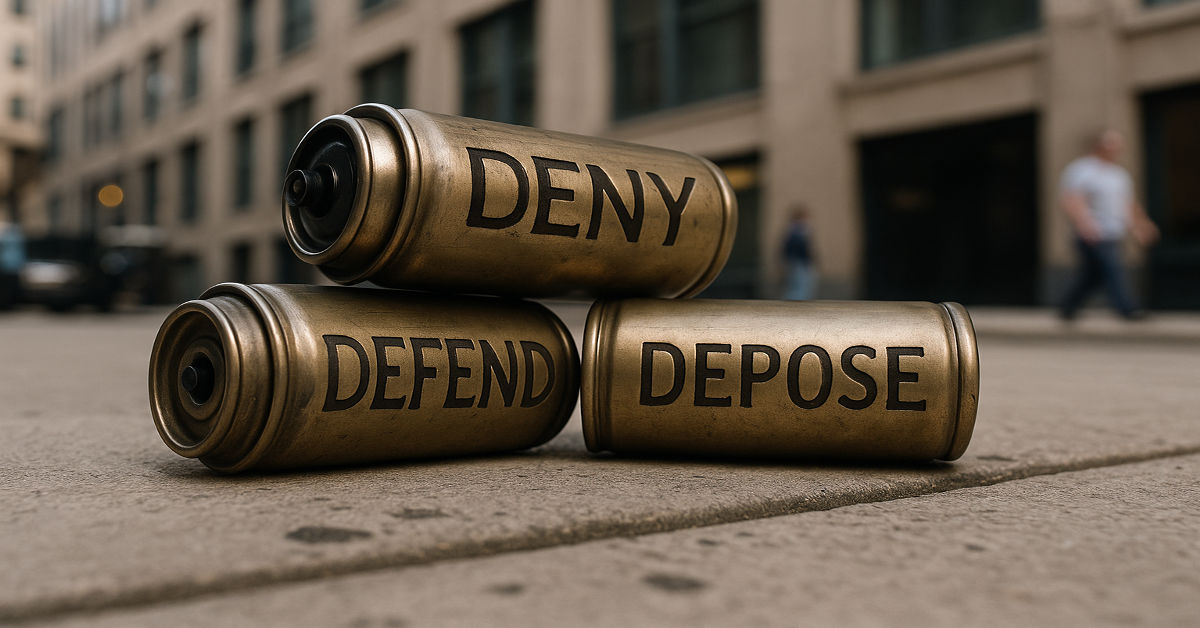In March 2025 a tragic event shocked the nation UnitedHealthcare CEO Brian Thompson was shot and killed. The alleged shooter, Luigi Mangione, left behind not only grief but also a message—three haunting words inscribed on bullet casings deny, defend, depose. This phrase, which once quietly operated within legal and insurance circles, has now exploded into public discourse. It’s spray-painted on buildings, shared on social media, and debated on news outlets. But what does Deny Defend Depose Meaning really mean? And how did it become a rallying cry—both for critique and, unfortunately, violence?
This article explores the origins, usage, and implications of the phrase deny defend depose in both its legal context and its new cultural resonance.
Origin of the Phrase Deny, Defend, Depose
The phrase deny, defend, depose originates from legal and insurance industry practices. It refers to a strategy used by some insurers when dealing with claims:
- Deny the claim initially
- Defend the decision in court if challenged
- Depose the claimant during legal proceedings to discredit or challenge their testimony
Though it may sound harsh, this three-step approach was historically designed to protect against fraudulent claims and legal liabilities. But in practice, especially when overused, it has often been accused of prioritizing profit over people.
The Legal Interpretation: What It Means in Insurance and Law
Within legal and insurance fields, this strategy is often part of risk management. Here’s how it plays out:
- Deny – Insurers may reject a claim based on policy exclusions, insufficient documentation, or perceived lack of validity.
- Defend – If a policyholder sues, the company mounts a defense using legal resources to argue the legitimacy of their denial.
- Depose – Legal teams interview the claimant under oath to test credibility and collect evidence for court.
While this process can be fair when grounded in evidence, critics argue that it can be weaponized to stall, exhaust, and intimidate claimants—especially in health, disability, and auto claims.
Historical Use by Insurance Companies
The deny defend depose model gained traction in the late 20th century as part of aggressive litigation strategies in the insurance industry. Large firms began training adjusters and legal staff to use this method as a standard operating procedure.
Over time, concerns emerged:
- Delays in critical care or financial support
- Burden of proof shifted heavily onto policyholders
- Legal costs increased for everyday people
- Trust between insurers and clients eroded
Multiple investigations and lawsuits have since shed light on questionable claim practices by some major insurers.
Case Study: UnitedHealthcare and the Mangione Incident
The tragic case involving Luigi Mangione brought deny defend depose into public view under horrific circumstances. Reports suggest Mangione had experienced years of delayed or denied medical care, allegedly triggering a breakdown that ended in violence.
While nothing justifies such actions, this tragedy sparked public scrutiny into insurance systems that many feel fail to serve their purpose.
The phrase on the bullet casings—deny, defend, depose—wasn’t random. It was a message, a grim commentary on perceived institutional neglect.
Table: Deny Defend Depose vs Ethical Claims Practices
| Claim Handling Strategy | Deny Defend Depose | Ethical Claims Practices |
| Initial Claim Review | Often immediate rejection | Fair, evidence-based analysis |
| Claimant Communication | Limited, legalistic | Transparent, supportive |
| Legal Involvement | Early and aggressive | Last resort |
| Claimant Experience | Adversarial | Collaborative |
| Public Perception | Profit-driven | Service-oriented |
Media and Social Impact of the Phrase
Since the shooting, deny defend depose has trended across platforms like Twitter, Reddit, and Instagram. Activists use it to criticize healthcare profiteering, while others worry it incites hostility.
In the media:
- Journalists explore its legal origins
- Documentaries are underway
- Graffiti and public installations echo the phrase
It has become both a warning and a war cry—depending on who’s wielding it.
Psychological Impacts and Public Reaction
The virality of deny defend depose is not just about words—it reflects real suffering. Thousands have shared their own experiences of claim denials, delayed care, and bureaucratic battles.
Common emotional themes:
- Helplessness
- Betrayal
- Financial anxiety
- Medical desperation
This growing collective anger is shaping how people perceive not only insurers but the larger systems of healthcare, law, and government.
The Legal Ethics Debate
Legal professionals now find themselves at a crossroads.
On one hand, defense attorneys argue that deny defend depose is a necessary tool to maintain system integrity and prevent abuse.
On the other hand, critics—including some within the field—say that ethics are being compromised in the name of corporate preservation.
Should legal strategy ever override human need? That question lies at the heart of the current debate.
When Strategy Becomes Symbolism
What was once a niche term has transformed into a symbol of resistance. But it also risks becoming a symbol of extremism.
Why it matters:
- The line between peaceful protest and incitement can blur quickly
- Language shapes perception and action
- Misunderstanding or misapplying phrases like deny defend depose can lead to real-world consequences
This transformation from courtroom jargon to cultural slogan has made it more powerful—and more dangerous.
Is It a Protest or a Threat?
Graffiti of deny defend depose has appeared on courthouses, hospitals, and insurance offices. Some see it as righteous protest. Others, especially after the Mangione case, see it as a potential threat.
This raises tough questions:
- Can language be weaponized?
- Should protest language have boundaries?
- Is systemic frustration enough to justify acts of aggression?
These are not easy answers, but they must be asked as this phrase gains momentum.
Future Implications in Law, Society, and Language
Whether the phrase continues to be used or fades from public discourse, its ripple effects will linger.
Possible outcomes:
- Stricter regulations on insurance practices
- Greater transparency mandates
- Legal reforms to protect claimants
- Continued polarization over systemic reform
More immediately, it has forced industries and individuals alike to reevaluate how justice, profit, and care intersect.
Conclusion
The phrase deny defend depose has moved from courtrooms to conversations, from strategy to symbol. Its rise in popularity is not just a trend—it’s a reflection of deep dissatisfaction with how people are treated in systems meant to protect them.
As individuals, professionals, and society at large, we face a crucial moment Deny Defend Depose Meaning. Do we address the systemic flaws that gave rise to such rhetoric—or do we risk further alienation, misunderstanding, and even tragedy?
If you’ve faced unfair insurance practices or want to be part of the dialogue around justice and reform, consider sharing your story or supporting legislative change Deny Defend Depose Meaning. Your voice matters, and together, words can lead to action—not destruction.
Frequently Asked Questions
What does Deny Defend Depose Meaning in law?
It refers to a three-step strategy used by some insurance companies: deny the claim, defend their decision in court, and depose the claimant during legal proceedings.
Is it illegal for companies to deny claims?
Not inherently. However, if done unjustly or systematically without proper investigation, it can lead to lawsuits and regulatory action.
Why is the phrase controversial now?
Because it was linked to a tragic murder case and has since become a symbol of frustration and protest against perceived healthcare and legal injustices.
Is deny defend depose still used by insurance companies today?
Yes, in some form. While not all companies follow this method, elements of it still exist, especially in contested claims.
Can the phrase inspire violence?
Language can influence behavior, especially when used repeatedly in emotionally charged contexts. Its association with a violent act has increased concern about how it’s interpreted.


